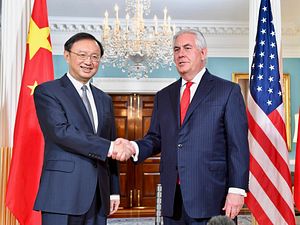U.S. Secretary of State Rex Tillerson is out after just fourteen months in the Trump administration. Tasked with implementing Trump’s ‘America First’ vision, Tillerson undertook his fair share of foreign trips, trying—ultimately with futility—to transition from a lifelong oil executive to the top U.S. diplomat.
Tillerson’s most infamous legacy will be his negative impact on the department he ran. The U.S. State Department sits today as something of a husk of its former self, with staff morale shockingly low and a large exodus of career officers having hollowed out years of experience and expertise. But when Tillerson wasn’t rethinking the way the State Department worked, he was traveling—ostensibly trying to implement Trump’s foreign policy vision in good faith.
In Asia, his record is largely underwhelming. During his confirmation hearings early in Trump’s term, Tillerson made important flubs, showing that he would have a challenging time adapting to the careful language of international diplomacy. The shibboleths of long-standing U.S. policy on nuanced questions weren’t obvious to him; he recommended, for instance, blockading China from its possessions in the South China Sea—an action that may have been the precursor to a major conflict—during his confirmation hearing.
On a trip to China last year, Tillerson appeared to be caught with his pants down when he, without hesitation, repeated Chinese language on non-interference, accommodation, and spheres of influence—handing Beijing an easy optics victory. That incident, fortunately, didn’t come around to bite Tillerson, but it still underlined how easily his more experienced counterparts could take him for a ride.
In India, Tillerson may be remembered more fondly. His October 2017 speech on U.S. relations with India will go down as a significant framing moment for the bilateral relationship, placing it in the broader context of an Indo-Pacific strategy for Washington. (That Indo-Pacific fervor has gripped Asia’s large, like-minded democracies, of course.) Tillerson’s sharp criticism of China’s Belt and Road Initiative later in his term also earned him praise in New Delhi.
In Southeast Asia, Tillerson mostly managed to keep up the appearance of long-institutionalized U.S. policy toward the region remaining on track. His May 2017 special meeting with all ten foreign ministers from the Association of Southeast Asian Nations states in Washington, D.C., was a moment to remind Southeast Asia that Washington was still paying attention to its concerns, despite the chaos in Washington. Tillerson also managed to elevate North Korean sanctions implementation on the U.S.-ASEAN agenda at that meeting.
On North Korea—the Trump administration’s top national security issue—Tillerson saw embarrassing setbacks. Though he deserves credit for publicly voicing support for diplomacy while many senior officials, including the president, threatened war, Tillerson was largely unable to exercise influence. Trump humiliated Tillerson by asking him to “save [his] energy” in a tweet, while he was trying to find some diplomatic opening.
On the North Korea issue, Tillerson had some support from Defense Secretary Jim Mattis, who ultimately ended up being the more persuasive voice on a non-military solution. His departure now won’t necessarily affect the eventual productivity of the U.S.-North Korea summit, which appears to face a number of obstacles with or without Tillerson.
Where Tillerson’s departure may be felt in the coming weeks and months, however, is in terms of coordination with U.S. allies in East Asia. South Korean Foreign Minister Kang Kyung-hwa and Japanese Foreign Minister Taro Kono are both scheduled to meet Tillerson in the coming days. Turning this opportunity with North Korea into a success will require close coordination with both allies.
The timing of Tillerson’s firing—more than any intrinsic qualities he’d bring to bear—is then unfortunate. Pompeo will be stuck in confirmation hearings and then enter the international diplomatic stage with no personal rapport with his counterparts in allied states.
I suspect history will not be kind to Rex Tillerson’s legacy at the State Department. And he certainly does not have a diplomatic record in Asia or elsewhere to back up his deleterious bureaucratic mismanagement in Washington.
The one silver lining for Tillerson is that his successor, Pompeo, appears wholly to be an enabler of Trump, content to following the president’s impulses. That might reduce the proverbial distance between Foggy Bottom and the White House, but it may also lead the State Department into a new period of disarray as it scrambles to implement Trump’s ‘America First’ agenda.

































